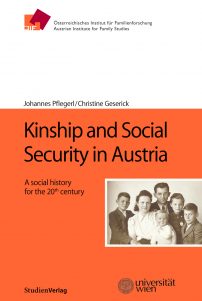Kinship and Social Security in Austria
A Social History for the 20th CenturyThe state and the family, including the whole network of relatives, are the two greatest providers of social security in modern Europe. Like the state, the family provides care, education and financial support to the individual. But how do state and family interact along social change? Using empirical data and findings from historical social research, the authors outline the embedding of family and kin in the Austrian social insurance system, as it evolved along the 20th century. This outline is illustrated by over 50 charts and tables for Austria and selected European countries.
The analysis provides insight into:
– The chronology of the Austrian welfare state (1850-2000)
– Statistical trends regarding family change (fertility, marriage and family forms, household size, timing of biographical key events, etc.)
– The legal evolution of social security and family policy
– Intergenerational transmission of social security
– Demographic aspects of kin availability and stability
– Changes of societal attitudes towards family relations
– A timeline of cultural ideologies and political measurements
– Gender aspects of giving and receiving social support
This Austria-focussed outline is embedded in the interdisciplinary EU-project „KASS“ („Kinship and Social Security“) funded by the European Union’s Sixth Framework Programme.
Johannes Pflegerl, Mag., sociologist at the Ilse Arlt Institute on Social Inclusion Research at the University of Applied Sciences in St. Pölten with research areas: sociology of family, youth welfare, family and migration.
Christine Geserick, M.A., sociologist at the Austrian Institute for Family Studies at the University of Vienna with the research areas: sociology of family, youth and gender.
Sie müssen den Inhalt von reCAPTCHA laden, um das Formular abzuschicken. Bitte beachten Sie, dass dabei Daten mit Drittanbietern ausgetauscht werden.
Mehr InformationenSie sehen gerade einen Platzhalterinhalt von Facebook. Um auf den eigentlichen Inhalt zuzugreifen, klicken Sie auf die Schaltfläche unten. Bitte beachten Sie, dass dabei Daten an Drittanbieter weitergegeben werden.
Mehr InformationenSie sehen gerade einen Platzhalterinhalt von Instagram. Um auf den eigentlichen Inhalt zuzugreifen, klicken Sie auf die Schaltfläche unten. Bitte beachten Sie, dass dabei Daten an Drittanbieter weitergegeben werden.
Mehr InformationenSie sehen gerade einen Platzhalterinhalt von X. Um auf den eigentlichen Inhalt zuzugreifen, klicken Sie auf die Schaltfläche unten. Bitte beachten Sie, dass dabei Daten an Drittanbieter weitergegeben werden.
Mehr Informationen

